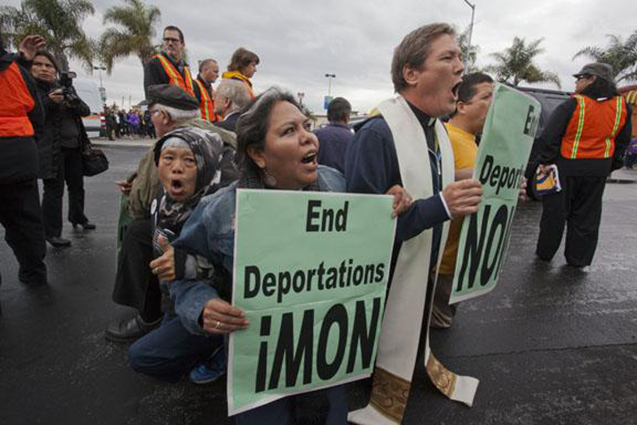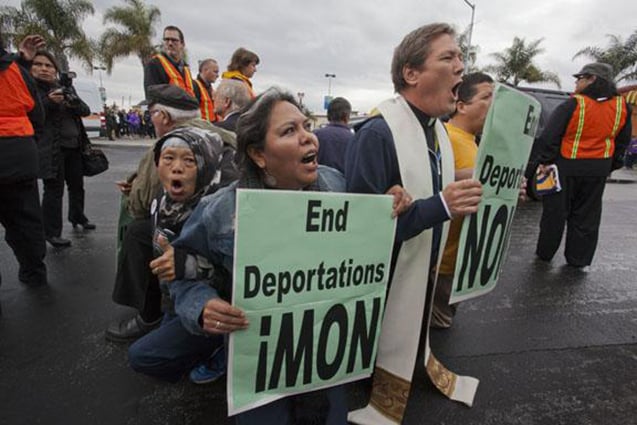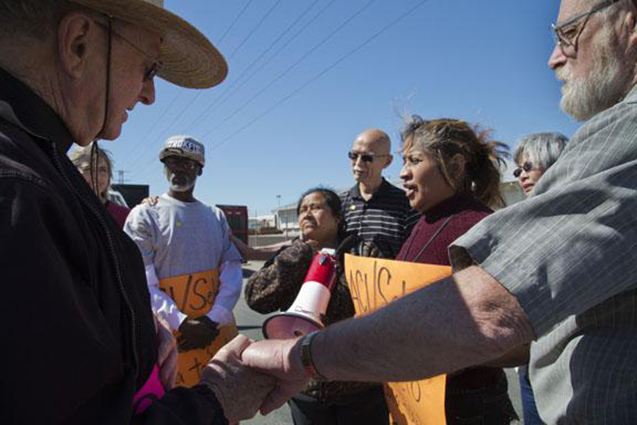
Did you know that Truthout is a nonprofit and independently funded by readers like you? If you value what we do, please support our work with a donation.
With Congress gridlocked and unable to pass even the deeply flawed comprehensive immigration reform, activists around the country are successfully challenging the injustices inherent in US immigration policy and enforcement.
Two weeks ago, hundreds of people inside the Tacoma (Washington) Detention Center launched a hunger strike against its private operator, GEO Group, demanding better conditions and a moratorium on deportations. Activists, who have held vigils outside the center for years, now gather every day to support those inside. A week later the strike spread to a GEO facility in Texas. According to Maru Mora Villapando of Latino Advocacy in Tacoma, in both locations the company has isolated the strikers and in Tacoma threatened to force-feed them.
 Immigrants, workers, union members, people of faith and community activists demonstrate in front of the Mi Pueblo market in East Palo Alto, California, calling for a moratorium on deportations and on the firing of undocumented workers because of their immigration status. (Photo: David Bacon)
Immigrants, workers, union members, people of faith and community activists demonstrate in front of the Mi Pueblo market in East Palo Alto, California, calling for a moratorium on deportations and on the firing of undocumented workers because of their immigration status. (Photo: David Bacon)
This is only the most dramatic action of a wave of activity around the country, in which community and labor activists, and now deportees themselves, have refused to endure increased immigration enforcement quietly. They are mostly young, deriving much of their inspiration from the Dreamers who forced the administration two years ago to begin providing legal status to some of those who otherwise would be deported. These activists refuse to wait for Congress to enact its immigration reform proposals. In fact, many reject those proposals as fatally compromised. Instead, they’re organizing actions on the ground to win rights and equality:
– In Tucson, San Francisco, Phoenix, Chicago and other cities, people sat down in front of ICE buses and vans and chained themselves to vehicles to block deportations. In Tucson, they stopped the Operation Streamline anti-immigrant court, which every day sentences dozens of young border crossers, all brought before a judge in chains, to months in prison.
– Supervisors in Los Angeles and San Francisco passed resolutions demanding a moratorium on the huge wave of deportations – 2 million people in five years. The San Francisco resolution also demanded an end to the tens of thousands of immigration-related firings.
– Ju Hong – a young immigrant whose deportation was deferred in the White House’s executive action two years ago – challenged President Obama at a West Coast fundraiser, telling him, “You have the power to stop deportations.”
– In Burlington, Washington, immigrant farm workers from Oaxaca went on strike repeatedly last year for labor rights and better pay and to stop a grower from using the H2A guest worker program to replace them.
– In Jackson, Mississippi, immigrant-rights activists helped elect a radical African-American mayor. Their broad coalition defeated a wave of state anti-immigrant bills, as they have in every session of the Legislature for years.
This growing insurgency is a direct response to the fact that the Obama administration, like the Bush administration before it, has implemented the harshest parts of Congress’ immigration reform proposals, even while Congress has been paralyzed and unable to pass them. Hundreds of thousands are deported every year. Tens of thousands more are fired from their jobs simply because they’re undocumented. The number of contract guest workers brought to the United States at low wages and reduced labor rights is growing. One report by Visas Inc. put the number at 900,000 last year.
The Washington disconnect is breathtaking. While increasing enforcement, the administration insists on a new trade treaty, the Trans-Pacific Partnership, guaranteed to cause more poverty in other countries, leading to yet more undocumented migration. And instead of debating this consequence openly, the administration wants a “fast track” process that would prohibit Congress from even discussing this impact. That’s hardly a surprise, because a debate would reveal that the North American Free Trade Agreement, adopted 20 years ago, led to the forced migration of 8 million people from Mexico.
It is no wonder that anger in immigrant and working-class communities is growing and, with it, the actions that challenge these enforcement and labor broker policies on the ground. Yet some voices in Washington continue to insist that Congress take a vote on the comprehensive immigration reform bills, claiming they would bring a progressive change in US immigration policy.
The comprehensive immigration reform strategy always has been based on a dangerous trade-off. Immigrant communities are promised some kind of legalization, which gets more and more limited with every proposal. In the last bills, SB744 and HR15, possibly half the undocumented population would fail to meet all the requirements in the tortuous and lengthy legalization process, or simply refuse to come forward. And in exchange for this, communities and unions must agree to increased enforcement – escalating militarization of the border and greater repression in workplaces – and expansion of guest-worker programs.
 After immigrant recycling workers in San Leandro, California, were fired at Alameda County Industries, they went back to the facility with supporters from local immigrant-rights organizations, unions and people of faith. As they spoke out against the injustice of their firing, they were encircled by pastors and religious activists, who joined hands in a symbolic pledge to offer them protection. African-American workers also are on the recycling lines, and one worker who had been fired recently joined the immigrants and was included in the circle of protection. (Photo: David Bacon)
After immigrant recycling workers in San Leandro, California, were fired at Alameda County Industries, they went back to the facility with supporters from local immigrant-rights organizations, unions and people of faith. As they spoke out against the injustice of their firing, they were encircled by pastors and religious activists, who joined hands in a symbolic pledge to offer them protection. African-American workers also are on the recycling lines, and one worker who had been fired recently joined the immigrants and was included in the circle of protection. (Photo: David Bacon)
Employers see immigration policy as way to satisfy their desire for workers at the lowest possible wages, with the fewest possible rights. Whether they’re looking for farm workers, construction workers or high-tech workers, their objective is to ensure that wages go down as workers compete for increasingly insecure jobs.
This comprehensive immigration reform strategy, therefore, trades immigrants’ civil and labor rights, including those of the braceros employers want, for the legalization of some of the undocumented. Leaving aside its morality, even as a practical strategy it’s proven to be unsuccessful. For the third time – 2006, 2009 and now 2013-14 – the trade-off tactic has been unable to deliver progressive change.
Punitive immigration enforcement, more guest workers and a new free trade agreement are no solution to the problems facing immigrants and working people. It is long past time to move away from these ideas.
The widespread actions fighting the impact of anti-immigrant policies are doing exactly that, while at the same time they point to deeper and better solutions. When people stand in front of the buses or go on hunger strikes to protest firings and deportations, they are calling for something fundamental – the right to live as equals in this country, as full participants with rights.
A powerful, principled movement, based on the efforts taking place on the ground, can not only challenge existing policies but can win a new and better bill. This is the lesson of the civil rights movement. That movement sought more than legislation, although it eventually produced two of the country’s most important laws – the Civil Rights Act and the Voting Rights Act. But it won those laws by organizing people for change where they lived – in their communities and workplaces – and because it fought for equality on the ground. It resisted the pressure to compromise for anything less, and it grew so large and strong that it forced Congress to pass legislation that embodied its demands.
Despite pressure from Washington to line up behind the comprehensive immigration reform bills, many groups have advocated alternatives, including the American Friends Service Committee, the Dignity Campaign, the Hermandad Mexicana Latinoamericana and many local unions and labor councils. There is growing agreement among them that to halt the deportations and detention quotas, end employer sanctions and workplace enforcement programs and protect family-based migration instead of low-wage labor schemes, we have to change the way we think about immigration reform.
An alternative based on rights would offer permanent-residence status quickly to all the undocumented, with a clear path to citizenship for those who want to exercise political rights. It would increase the number of family visas while ending guest worker programs – the humanistic vision of the 1965 immigration act that passed at the height of the civil rights movement. It would end mass deportations and huge privately run detention centers and enforce labor rights instead of firing workers because they don’t have papers. It would end the militarization of the border and restore civil rights in border communities and friendship with those on the other side. And it would stop new trade agreements and renegotiate old ones, like NAFTA, to prevent them from causing poverty and dislocation.
Figuring out the alternative isn’t really the hard part. It’s building a movement strong enough to force Congress and the administration to enact it. But this is possible, as our own history tells us. Historian Howard Zinn warned: “When a social movement adopts the compromises of legislators, it has forgotten its role, which is to push and challenge the politicians, not to fall in meekly behind them.” Zinn believed people have the power to win radical demands. “If there is going to be change, real change,” he said, “it will have to work its way from the bottom up, from the people themselves. That’s how change happens.”
Matching Opportunity Extended: Please support Truthout today!
Our end-of-year fundraiser is over, but our donation matching opportunity has been extended! All donations to Truthout will be matched dollar for dollar for a limited time.
Your one-time gift today will be matched immediately. Your monthly donation will be matched for the whole first year, doubling your impact.
This matching gift comes at a critical time. As Trump attempts to silence dissenting voices and oppositional nonprofits, reader support is our best defense against the right-wing agenda.
Help Truthout confront Trump’s fascism in 2026, and have your donation matched now!